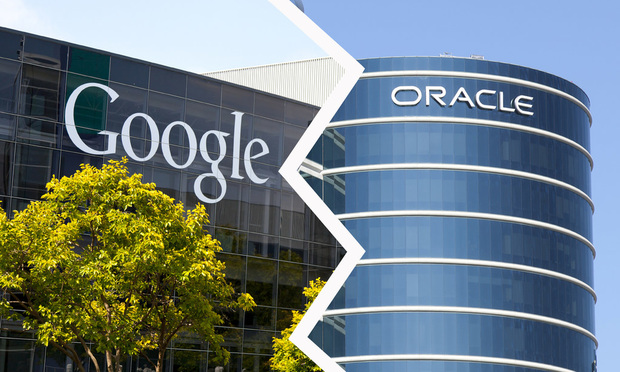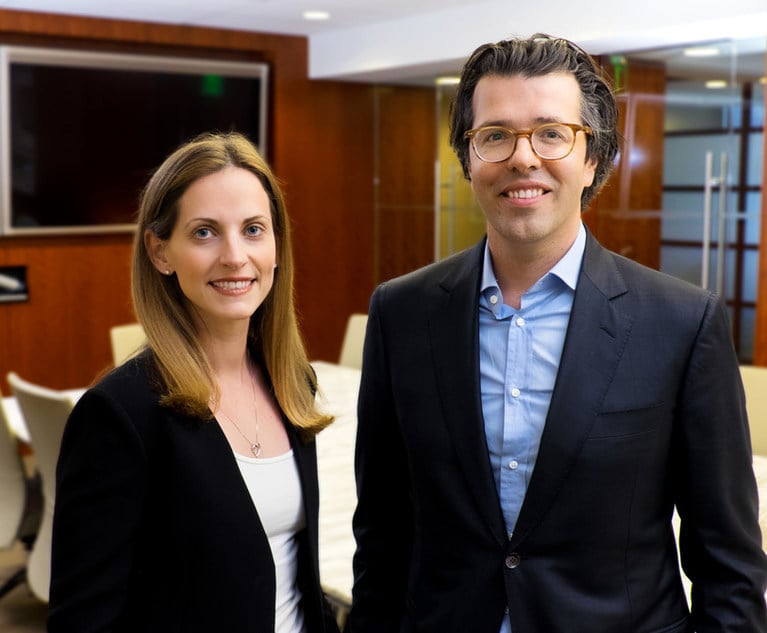SCOTUS Asks SG's Views on Oracle-Google Copyright Case
The Silicon Valley titans have been disputing for nine years whether Google violated Oracle's copyright by copying Java application programming interfaces into its Android operating system.
April 29, 2019 at 11:05 AM
6 minute read
The original version of this story was published on National Law Journal

The U.S. Supreme Court just doesn't seem to know what to make of the titanic copyright clash between Oracle Corp. and Google LLC over the Java application programming interfaces, or APIs.
The high court asked the Solicitor General's Office to weigh in for a second time on Google v. Oracle, which Google calls “the copyright case of the century.” The justices first asked for the SG's views when the only question before the court was the copyrightability of the APIs, 11,500 lines of code that form a structure for basic programming functions. The SG found them copyrightable, and the court declined to take up the case at that time.
This time Google is asking the court to review both copyrightability and whether Google's copying of the APIs into its Android operating system was a fair use. A jury said it was, but the U.S. Court of Appeals for the Federal Circuit ruled it was not a fair use as a matter of law.
The Supreme Court's brief unsigned order Monday does not specify which issue its seeking input on, though presumably the SG will focus primarily on fair use since it's already offered its views on copyrightability.
Michael Barclay, a special counsel at the Electronic Frontier Foundation who co-authored an amicus brief in support of Google's cert petition, said copyrightability is relevant to fair use. “So the issue hasn't completely gone away regardless of whether the new SG will defer to the old SG,” he said.
Plus, he noted the law of copyrightability in the U.S. Court of Appeals for the Ninth Circuit has changed since the SG's previous recommendation thanks, in part, to the Bikram yoga copyright case.
If nothing else, the referral reflects an ongoing interest in the case among at least a few of the justices. Whether there will be four votes for cert will likely remain unknown until after the SG makes a recommendation next fall.
The referral to the SG is likely to once again stir the 50-year-old debate over how much, if any, software should be subject to copyright, and the contours of the fair use defense in the digital age.
Google contends that Federal Circuit decisions in 2014 and 2018 threw “a devastating one-two punch at the software industry.” Oracle argues that the industry has, in fact, flourished in the wake of the rulings.
If the court were to take the case and reverse on either issue, it likely will end Oracle's nine-year quest for billions in unpaid royalties. If cert is ultimately denied, Oracle will get one more shot at a damages trial before U.S. District Judge William Alsup of San Francisco.
The battle has generated intense amicus interest on both sides among academics, computer scientists, industry and nonprofit advocacy groups. The Harvard Journal of Law and Technology devoted a special issue to the case and its implications last spring.
The APIs comprise 11,500 lines of declaring code organized into 37 packages. The code provides a shorthand for accessing pre-existing libraries of implementing code. Google copied the declaring code so that programmers could use the familiar Java declarations to build their own Android applications. Google wrote its own implementing code.
Oracle's predecessor, Sun Microsystems, never successfully developed its own smartphone platform using Java, but it licensed Java to others for their mobile devices. Oracle argues Google usurped that business through its unfair copying. Android had generated more than $42 billion in advertising revenue for Google as of 2016.
Alsup ruled following the first trial in 2012 that the APIs are not copyrightable because they represent a command structure or method of operation that could not be written any other way. The Federal Circuit disagreed and sent the case back for a second trial on whether Google's copying was a fair use.
Jurors found the use fair in 2016, but the Federal Circuit reversed again, saying that Google's development of a mobile version of the APIs was not transformative, and that the law protects a copyright owner's right to enter a potential new market.
Google argued in its cert petition that the interfaces at issue in Google v. Oracle provide a structure that's essential for others to build new computer programs, and should therefore be beyond the reach of copyright. The Supreme Court took up a similar issue in 1996's Lotus v. Borland, but wound up deadlocking 4-4. Oracle has long argued, and the Federal Circuit agreed, that Google purposely made its Android software platform incompatible with Oracle's, undercutting Google's interoperability argument.
As for fair use, Google argued that the Federal Circuit upended “the longstanding expectation of software developers that they are free to use existing software interfaces to build new computer programs.” Oracle argued in its brief-in-opposition that it shouldn't be “required to let a competitor copy its code so that it can [co-op] the fan base to create its own best-selling sequel.”
Berkeley law professor Peter Menell, another amicus for Google, said the Supreme Court's action, known as a CVSG, “shows that the court recognizes the seriousness of the issues. The government's position four years ago was deeply flawed.”
Menell said copyrightability is the key issue. “Fair use is dependent on copyrightability,” he said. “And getting copyrightability right would largely moot fair use.”
Goldstein & Russell's Thomas Goldstein is counsel of record for Google. He took over after Kannon Shanmugam, counsel of record on Google's cert petition, left Williams & Connolly for Paul, Weiss, Rifkind, Wharton & Garrison. Williams & Connolly remained on the briefs, with partner Lisa Blatt at the top of its list. Attorneys at Keker, Van Nest & Peters; King & Spalding; and Kwun Bhansali Lazarus also represented Google.
Orrick, Herrington & Sutcliffe partners E. Joshua Rosenkranz and Annette Hurst and Kirkland & Ellis partner Dale Cendali appeared on Oracle's brief in opposition, along with Oracle general counsel Dorian Daley and associate GCs Deborah Miller and Matthew Sarboraria.
This content has been archived. It is available through our partners, LexisNexis® and Bloomberg Law.
To view this content, please continue to their sites.
Not a Lexis Subscriber?
Subscribe Now
Not a Bloomberg Law Subscriber?
Subscribe Now
NOT FOR REPRINT
© 2025 ALM Global, LLC, All Rights Reserved. Request academic re-use from www.copyright.com. All other uses, submit a request to [email protected]. For more information visit Asset & Logo Licensing.
You Might Like
View All
Litigator of the Week: Reversing a $2B Trade Secret Verdict, the Largest in Va. History

Litigators of the Week: Irell Duo Lands Another Big West Texas Win, This Time $240M for StreamScale

Litigators of the Week: In Delaware Chancery Trial, Latham Defends Oracle's $9.3B NetSuite Deal
Trending Stories
- 15th Circuit Considers Challenge to Louisiana's Ten Commandments Law
- 2Crocs Accused of Padding Revenue With Channel-Stuffing HEYDUDE Shoes
- 3E-discovery Practitioners Are Racing to Adapt to Social Media’s Evolving Landscape
- 4The Law Firm Disrupted: For Office Policies, Big Law Has Its Ear to the Market, Not to Trump
- 5FTC Finalizes Child Online Privacy Rule Updates, But Ferguson Eyes Further Changes
Who Got The Work
J. Brugh Lower of Gibbons has entered an appearance for industrial equipment supplier Devco Corporation in a pending trademark infringement lawsuit. The suit, accusing the defendant of selling knock-off Graco products, was filed Dec. 18 in New Jersey District Court by Rivkin Radler on behalf of Graco Inc. and Graco Minnesota. The case, assigned to U.S. District Judge Zahid N. Quraishi, is 3:24-cv-11294, Graco Inc. et al v. Devco Corporation.
Who Got The Work
Rebecca Maller-Stein and Kent A. Yalowitz of Arnold & Porter Kaye Scholer have entered their appearances for Hanaco Venture Capital and its executives, Lior Prosor and David Frankel, in a pending securities lawsuit. The action, filed on Dec. 24 in New York Southern District Court by Zell, Aron & Co. on behalf of Goldeneye Advisors, accuses the defendants of negligently and fraudulently managing the plaintiff's $1 million investment. The case, assigned to U.S. District Judge Vernon S. Broderick, is 1:24-cv-09918, Goldeneye Advisors, LLC v. Hanaco Venture Capital, Ltd. et al.
Who Got The Work
Attorneys from A&O Shearman has stepped in as defense counsel for Toronto-Dominion Bank and other defendants in a pending securities class action. The suit, filed Dec. 11 in New York Southern District Court by Bleichmar Fonti & Auld, accuses the defendants of concealing the bank's 'pervasive' deficiencies in regards to its compliance with the Bank Secrecy Act and the quality of its anti-money laundering controls. The case, assigned to U.S. District Judge Arun Subramanian, is 1:24-cv-09445, Gonzalez v. The Toronto-Dominion Bank et al.
Who Got The Work
Crown Castle International, a Pennsylvania company providing shared communications infrastructure, has turned to Luke D. Wolf of Gordon Rees Scully Mansukhani to fend off a pending breach-of-contract lawsuit. The court action, filed Nov. 25 in Michigan Eastern District Court by Hooper Hathaway PC on behalf of The Town Residences LLC, accuses Crown Castle of failing to transfer approximately $30,000 in utility payments from T-Mobile in breach of a roof-top lease and assignment agreement. The case, assigned to U.S. District Judge Susan K. Declercq, is 2:24-cv-13131, The Town Residences LLC v. T-Mobile US, Inc. et al.
Who Got The Work
Wilfred P. Coronato and Daniel M. Schwartz of McCarter & English have stepped in as defense counsel to Electrolux Home Products Inc. in a pending product liability lawsuit. The court action, filed Nov. 26 in New York Eastern District Court by Poulos Lopiccolo PC and Nagel Rice LLP on behalf of David Stern, alleges that the defendant's refrigerators’ drawers and shelving repeatedly break and fall apart within months after purchase. The case, assigned to U.S. District Judge Joan M. Azrack, is 2:24-cv-08204, Stern v. Electrolux Home Products, Inc.
Featured Firms
Law Offices of Gary Martin Hays & Associates, P.C.
(470) 294-1674
Law Offices of Mark E. Salomone
(857) 444-6468
Smith & Hassler
(713) 739-1250







